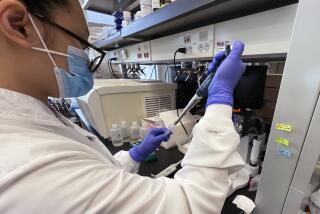Dirty scopes needlessly infected scores of patients, investigation finds

Dr. Zachary Rubin, associate clinical professor of infectious diseases at Ronald Reagan UCLA Medical Center, speaks during a Feb. 19, 2015, news conference outside the hospital addressing concerns about patients infected by a superbug during medical scope procedures.
- Share via
Scores of hospital patients treated with medical scopes were infected with potentially deadly bacteria because of repeated failures by manufacturers, regulators and hospitals to report outbreaks, according to a U.S. Senate investigation released Wednesday.
The investigators said they had found 25 outbreaks — including two in Los Angeles — linked to a device known as a duodenoscope, far more than previously reported.
And they said that numerous flaws in the federal government’s oversight of medical devices are continuing to put patients at risk “with life-threatening consequences.”
The new 301-page report confirms conclusions in a series of Times stories last year, which reported that Olympus Corp., the leading maker of the device, knew of the potential flaws in the scope but failed to alert American hospitals or regulators.
“Patients should be able to trust that the devices they need for treatment are safe and effective,” said Sen. Patty Murray (D-Wash.), who initiated the probe after dozens of patients were sickened at a Seattle hospital.
“Unfortunately this investigation makes clear that current policies for monitoring medical device safety put patients at risk, and in this case, allowed tragedies to occur that could have, and should have, been prevented,” she said.
The conclusions came in an investigative report by the minority staff of the Senate committee on health, education, labor and pensions. It concluded that executives from the Japanese firm, which sells 85% of the duodenoscopes used in American hospitals, were aware that three independent investigations had questioned whether the design of the $40,000 scope made it extremely difficult to clean. The company received the first of those reports in June 2012.
But Olympus — and the federal Food and Drug Administration — did not issue warnings about the potentially lethal problem with the device until February 2015 after The Times reported the superbug outbreak at UCLA’s Ronald Reagan Medical Center. Seven patients were sickened, including three who died.
From 2012 to 2015, investigators said that at least 141 patients in nine U.S. cities were infected.
“The faith that patients, doctors, hospitals and public health officials placed in Olympus to thoroughly test their cleaning instructions before putting devices in the marketplace was clearly misplaced,” the investigators wrote.
The investigators also concluded that Olympus had repeatedly offered misleading information that downplayed the growing number of patient infections.
For example, Olympus sent an alert to European hospitals — but not to those in America — in January 2013. At that time, the company was aware of at least three scope-related outbreaks sickening at least 46 patients in three countries, the investigators said. But the company’s European alert only referred to “a recently reported case” of a contaminated scope.
The investigators said Olympus and two other scope manufacturers “failed at every level to meet basic expectations of transparency and openness and to actively engage with FDA to address contamination issues.”
“This disregard for the spirit, and sometimes the letter, of the law resulted in potentially preventable serious and potentially fatal illnesses in hospitals around the world,” they wrote.
Glenn Smith, whose 19-year-old son Aaron Young nearly died after being infected with a superbug from a scope at UCLA, said the report shows that Olympus “deliberately covered it up and allowed people to be infected. I don’t even have words for that.”
The duodenoscope is used in a procedure known as ERCP, or endoscopic retrograde cholangiopancreatography. Doctors thread the flexible scope down a patient’s throat and into the digestive tract to diagnose and treat cancers, gallstones and other conditions.
The Senate report also blamed the FDA and hospitals for not raising an alarm.
The FDA began to investigate the scopes in September 2013, the report said, but “wasted valuable time” in seeking data from Olympus and two other manufacturers on whether they could prove the devices could be properly cleaned.
Hospitals also failed to file required injury reports, which could have helped stop the infections.
“Not a single hospital that experienced infection outbreaks tied to the duodenoscopes appears to have sent the required adverse event form,” the report said.
The investigators said they believed that many other patient infections have never been reported. Other hospitals likely experienced similar outbreaks, they said, but have not tried to pinpoint or track the infections.
The FDA requires manufacturers to file reports of injuries tied to their devices. The system — known as Maude — was designed to help give an early warning about defective devices.
But the investigators called the system a “fallacy” because of its reliance on manufacturers and hospitals to report the injuries.
Olympus filed some reports months late. And in most of the reports, the company suggested that something other than its scope, including poor cleaning procedures by hospitals, were to blame.
The FDA also strips all hospital names and locations from the reports, making it difficult to track the outbreaks.
Mark Miller, an Olympus spokesman, said Wednesday that the company had been cooperating with the investigators for several months.
“Although we do not agree with all of the report’s conclusions,” Miller said, “we are closely reviewing the recommendations in the report as part of Olympus’ ongoing efforts to increase patient safety associated with use of Olympus duodenoscopes.”
Deborah Kotz, an FDA spokeswoman, said Wednesday that stopping the risk of device-related infections “is a top priority” for the agency.
“The FDA has taken several actions to address the issue of duodenoscope-related infections and will continue to work to protect patients while ensuring access to these important devices for those who may benefit from minimally invasive procedures,” Kotz said.
Other manufacturers of the scope are Pentax and Fujifilm. A spokeswoman for Pentax said Wednesday that the company was working with Congress and regulators to reduce the risk of infection from scopes.
And Fujifilm spokeswoman Diane Rainey said: “The protection of the health and safety of all patients remains the No. 1 priority of Fujifilm, and we are committed to working together with all stakeholders, including patients, hospitals, regulators and lawmakers, to ensure the long-term sustainable use of duodenoscopes.”
The investigators called for the FDA to quickly evaluate the scope’s sealed design, which was put on the market in 2010 and touted as being easier to clean because it blocked out infectious material from a tiny internal channel. It “is now evident” that such models can “trap and transmit bacteria” even after cleaning, the report said.
The FDA has said it decided not to recall the redesigned scopes because there is no other device to perform ERCP.
But the investigators said the FDA should consider “a phased recall” of the devices so that they can be repaired or modified and properly disinfected.
They also called for the FDA to stop relying on manufacturers and hospitals to report injuries caused by devices. Instead, the system should be strengthened, they said, so the devices have unique identifying numbers that can be tracked in pharmacy insurance claims and electronic health records.
And they said that hospitals should be required to file reports of injuries caused by medical devices as a condition of participating in the Medicare system.
More to Read
Inside the business of entertainment
The Wide Shot brings you news, analysis and insights on everything from streaming wars to production — and what it all means for the future.
You may occasionally receive promotional content from the Los Angeles Times.











